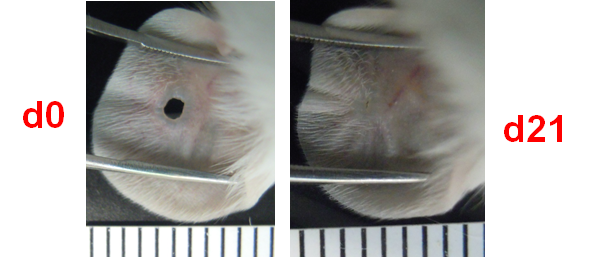RESEARCH FOCUS
The Laboratory is focused on molecular basis of mammalian regeneration, in particular the epigenetic aspects of regenerative potential and pharmacological stimulation of regeneration.
We use mouse models and examine transcriptomic and methylome profiles in regenerating tissues.
NOVEL STRATEGY FOR REGENERATIVE THERAPY
The latest achievement of LRB is the development and application of a novel pharmacological strategy for regenerative therapy on an animal model. This therapy is based on the combined use of an epigenetic inhibitor and a transcriptional activator leading to epigenetic de-repression of silenced genes and transcriptional inductions.

Ear pinna regeneration after combined treatment with zebularine and retinoic acid EBioMedicine 2019
The activated genes include those of pluripotency and neurogenesis. Such genes are expressed in early development and silenced in adults. We have demonstrated the effectiveness of this strategy by using zebularine as an epigenetic inhibitor of DNA methyltransferases and retinoic acid as a transcriptional activator of developmental genes. As a regeneration model, we chose the injury of ear pinna in BALB/c mice. Holes of 2 mm in diameter punched in the auricle of a normal laboratory mouse remain for life. After administration of zebularine and retinoic acid, within 3 weeks, there was a complete closure of the opening combined with regeneration of the structure of the ear pinna composite tissue..
EPIGENETIC BASIS OF REGENERATION
It is known that the human genome contains complete information that defines the structure and functions of organisms and that silencing of developmental genes is responsible for the decline of regenerative abilities in adult mammals. This assumption led Dr. Sachadyn to the hypothesis that temporary reversal of the epigenetic repression was possible to enhance healing potential.
Epigenetic regulation determines developmental and cell differentiation processes as well as stem cell potential. Regenerative abilities decline with development. We conjecture that transient epigenetic re-patterning could result in the temporary restoration of the regenerative capacity characteristic of embryonic and neonatal periods but repressed in adults, thus promoting tissue regeneration.
Our studies conducted in three mammalian models of regenerations: the adult MRL/MpJ mouse, the neonatal murine heart and the mouse foetal skins showed decreased methylation of developmental genes that are usually silenced in adult organisms.
PHARMACOLOGICAL STIMULATION OF REGENERATION
Our studies showed that complex tissue regeneration could be effectively stimulated pharmacologically in adult mammals. Patent applications have been filed to protect novel drug candidates for regenerative therapies.



